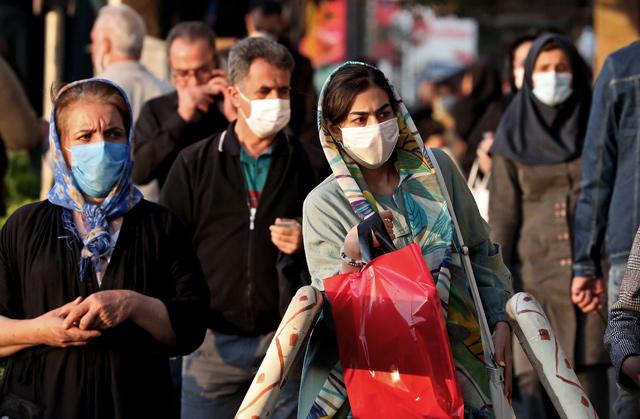- International News
- Tue-2020-10-20 | 06:43 pm

Nayrouz News Agency :
Iran on Monday announced 337 deaths from the novel coronavirus, a record high for a single day in the Middle East country hardest hit by the COVID-19 pandemic.
"Today we are facing a larger wave of this virus and we have to fight it,” President Hassan Rouhani said in a televised meeting with health officials.
Rouhani called on the health ministry to increase the number of daily COVID-19 tests, to help reduce the spread of infections.
The latest deaths brought to 30,712 the total number of fatalities since Iran reported its first coronavirus cases in February.
Iran’s previous record death toll for a day was 279 announced last Wednesday.
Iran said the total number of infections in the country reached 534,631 on Monday, with 4,251 people testing positive in the past 24 hours.
Deaths and infections from the virus have been on a rising trajectory in Iran and recorded several new highs since early September.
"One of the key solutions is identifying the infected as quickly as possible, isolating them as quickly as possible, and thus to reduce the need for hospitalisations and also reduce mortality,” Rouhani said.
"It’s not a problem if infections go up [due to increased testing], but it is important that the death rate does not.”
The virus figures were also likely to be higher than officially reported, Deputy Health Minister Iraj Harirchi acknowledged last week, primarily due to testing and reporting protocols.
Health Ministry spokeswoman Sima Sadat Lari said the latest spike in deaths was "unprecedented” and a result of poor compliance with health and mask protocols.
University student Ali Mohammadi agreed that the public were flouting health regulations ever since the economy gradually reopened.
"People are being less careful, whatever job they have. And they can’t really be blamed since the government has not helped them,” the 22-year-old told AFP.
"The main reason that numbers go up is that people either have to go to work and bring food to the table, or stay home and don’t contract the virus but die from hunger,” said a programmer named Sina Rouhani.
It is "like a saw stuck in a body. No way forward, no way back”, he added.
Iran is struggling with economic difficulties due to crippling sanctions reimposed by US President Donald Trump in 2018, after he unilaterally withdrew from a landmark nuclear agreement between Iran and world powers.
Earlier this month, Iran began imposing fines for the first time for breaches of health rules in the capital.
Tehran and four major cities were partially sealed off from last Thursday to midday Sunday in a bid to dissuade Iranians from travelling during holidays.
Authorities in the capital ordered the closure of most public places from October 3.













